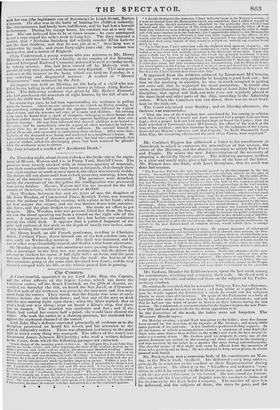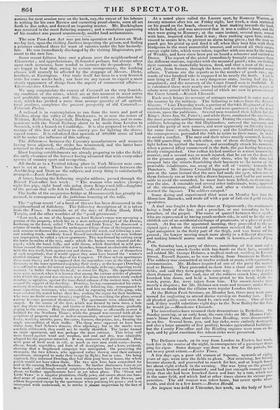Mr. Cuthbert Rippon has addressed a letter to his constituents
at Gateshead, in which he canvasses the proceedings of last session, the errors of the Ministry, and the abortive attempts to satisfy both Peers and People. He warns the new Administration of the necessity of adopting a decidedly liberal course. The following passages, written in a clear and manly style, give a fair notions of the tune of the letter. Mr. Rippon does not think, with Lord Brougham, that too much was done last session.
" The Poor-law Bill was the only measure passed by the Government in the late session. Au apology for their unfruitfultiess has been stirringly olff•red, in the plea of
much time being consumisl by the propositions Mother Members. By the rules of the }louse of Commons, Monday and Friday ate set ;quart for Ministerial MeISUretn, Tues- day and Thursday for the general business; thus one Ind( of the session is placed at the disposal of the Minister. tint let ins examine their proceedings in the late session. A bill for regulating Dissenters' marriages was introduced and withdrawn by Lord John Russell. A bill for altering the inelloat of levying Church.rates, and a bill for commuting English Tithes, were brought forward by Lorri Althorn ; who was so est tamed of his dishouest and blundering propositions, that he never ventured to MOW their se- cond reading. Again, in the other House, two bills for diminishing the evils of Plu- ralities and Non-residence were introdueed by the Chancellor, and removed by the same personage. Away, then, with crafty pretences and unreal excuses. Let the plait. tact be stated, that the Government had not courage to propose any measure w Inch would provoke the hostility of the Peers ; and they framed their !repositions wholly with re- gaol to the countenance of that holy. The attempt to ensnare the public jsidgment by a proposition to abolish Chorch.rates, and to substitute its lieu thereof a tax of 250,0001. in year, was a clumsy contrivance to gain concealment of an unprincipled object. Know- ing that the interest of all is the care of none, they expected that public indifference ins regard to the just disbursement of common means, would enable them to escape detection.
"'fine course of the present Ministry is clear. To prepare measures of substantial reform, to show sincerity and decision in carrying them onwanl, thus assuring the Peo- ple of their faithful intention. 'rite Commons would pass them by overwhelming
ma- joritics: the Liberal Members of that Douse would willingly Ilefer their individual plans at her than embarrass an honest Administration ; and it the !louse of Lords should ho pleased to reject them, it will be the duty of the People, at such a crisis, to come for- ward and claim from the Monarch the exercise of that prerogative which is intrusted to his charge to be employed for the C01111111011 Weal and safety. " We hear recommendations for COISti■P15 refin-m. Verily the advocates of this pru- dent course, hating consumed the of twin sessions n it limit notice of this prin- ciple, are exempt from the charge or prmipitancy. The abuses of our Church. the in- justice of our Laws, the grievances of Disissiteri, the cuspressiveness of Tithes, the cor-
rupt practices of Municipal Corpora time:, all reasion wit ; juslicc 10 the People is SIISpended—promises arc instultilled, and lisle alone is sustained by the ilausible commendation of caution."
Mr. Godson, Member for Kidderminster, spent the last week among his constituents, receiving and returning their calls. He dinned with it large party of friends, and addressed them on the subject of his l'arlia- memory conduct.
He continually remarked, that he was neither Whig nor Tory, but a Reformer, determined to amend but not to destroy ; 7nd that, whilst as a good Church- man lie would support the Established Church, he would vote for religious liberty to every class of Christians. Ile spoke of the Parliament as a body of legislators who were driven to and fro by tine dread of a dissolution ; and said that he had not one word of praise to bestow on their labours during the last see . Ile condemned, as unconstitutional in the highest degree, the new Poor- Law Bill, and took great credit for his warm oppositiun to it.
In the festivities of the week, the ladies were not forgotten The Worcester Herald says— On Monday evening, a grand feast was given to the ladies; sixty-five houses were opened on the occasion, at the expense of Mr. Godson ; and nearly 3000 ladies partook of tea and cake. A few landladies preferred finding suppers. At all the houses at which accommodation existed, a musician of some kind (for there were more dances than fiddlers in the towel) sent forth his hest strains to enliven a country-dance. Mr. Godson paid his respects to every one of the patties, between six o'clock in the evening and three o'clock in the morning; and was received by the ladies in a manner the most loving and enthusiastic. The cheerful scenes of that night will never be effieed from the metnories of those who participated in then,. He was chaired in forty-seven places, in chairs covered with laurel.
Mr. Buckingham met a numerous body of his constituents on Mon. day, in the Music Hall, Sheffield. He delivered a very long address, prine•ipally in reference to his conduct as their Representative during the last session. Ile alluelvd to the " friendless and unknown "con. dition ju which he enacted Isheffield three years ago, arid contia4ed it with the present enthusiasm in his favour. Ile mentioned the favour- able report of the Committee of Inquiry into his conduct in Indite and his treatment by the East India Company. The number of spee..hes he delivered, and the subjects of them, the votes he gave, and the
Justices for next session now on the book, nay, the extent of his labours in writing for his own Review and correcting proof-sheets, were all set forth in due order, and formed an imposing muster. Mr. Buckingham was received in the most flattering manner ; and a resolution approving of his conduct was passed unanimously, amidst loud acclamations.





















 Previous page
Previous page